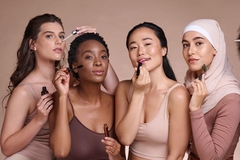MyMicrobiome launches “world’s first” certification for microbiome-friendly eczema care

MyMicrobiome has introduced the “first” global microbiome-specific benchmark for skin care and dermatological products targeting eczema-prone skin.
The certification, MyMicrobiome Derm Standard – Eczema, evaluates how products affect the microbial landscape of individuals with atopic dermatitis (AD), offering tailored criteria for both adult and infant skin.
According to the biotechnology company, the standard arrives as eczema continues to affect millions worldwide, causing chronic inflammation, skin barrier dysfunction, and impaired quality of life.
Dr. Kristin Neumann, co-founder and CSO of MyMicrobiome, emphasizes the need for standards beyond gentleness.
“Skin prone to eczema needs more than just mild formulations — it needs products that actively support microbial balance,” she says.

Selective strain inhibition
MyMicrobiome says AD is now widely recognized as a condition where a loss of microbial diversity allows harmful pathogens to dominate the skin environment. The skin’s increased vulnerability to external irritants and microbial imbalances can then trigger frequent and painful flare-ups, inflammation, and damage.
MyMicrobiome reports that up to 70% of eczema lesions are colonized by Staphylococcus aureus, a bacterium that worsens symptoms by disrupting the skin’s microbial equilibrium.
However, despite the growing evidence linking AD to microbiome dysbiosis (an imbalance in the composition and function of the microbiota), most skin care products remain untested for their impact on this delicate ecosystem.
The new certification aims to close this gap by requiring scientific testing that determines whether a product inhibits harmful microbial strains while preserving the beneficial bacteria necessary for skin health.
Moreover, infants, whose skin microbiomes are still developing, may require gentler but equally effective solutions. The company recognizes this distinction and sets separate performance thresholds and testing protocols adapted for each demographic to ensure a more personalized and safe skin care guidance.
.jpg) Infants, whose skin microbiomes are still developing, may require gentler but equally effective solutions.Products that meet the criteria will be eligible to carry the Microbiome-Friendly Derm Seal, signaling compliance with safety and efficacy standards.
Infants, whose skin microbiomes are still developing, may require gentler but equally effective solutions.Products that meet the criteria will be eligible to carry the Microbiome-Friendly Derm Seal, signaling compliance with safety and efficacy standards.
Scientifically validated skin care
MyMicrobiome’s certification involves in vitro assays conducted in certified laboratories in Switzerland and Germany.
The Derm Standard 27.10/11 – Eczema includes evaluating whether a product can minimize colonization by pathogenic strains while leaving commensals unaffected.
The introduction of this standard also responds to growing consumer demand for scientifically validated, microbiome-friendly skin care.
Earlier this year, LaFlore Live Probiotic Skin Care launched a home testing kit that analyzes the skin microbiome to offer personalized skin care advice. The kit uses Sequential Bio test strips and technology to measure bacterial balance, skin health markers, and biological skin age.
According to Sequential CEO Dr. Oliver Worsley, understanding the skin’s “invisible players” is key to long-term skin health.
Personal Care Insights also previously spoke with Stefan Pelzer from Evonik about its SkinMicrobes model. This lab model grows several common skin bacteria together to better test how cosmetic ingredients affect the skin’s microbiome.
Pelzer explained that this innovation enables more precise testing of how cosmetic ingredients influence microbial balance, helping brands make scientifically substantiated microbiome-friendly claims.













